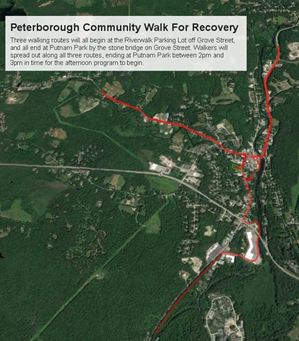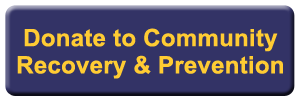Learn what Communities can do to reverse the Opioid Crisis and support those suffering from Substance Use Disorders
What: W alk 2 or 3 Miles (your choice) from the Riverwalk Parking Lot along one of three routes – North on Rt 202, South on Grove St. & Rt 202, and West on Union Street. Return to gather in Putnam Park, next to the stone bridge on Grove Street, or come directly to the park, to meet the agencies on the front lines of Substance Use Disorder prevention, treatment, therapy and recovery. Leading local Recovery and Prevention organizations will be there to discuss what our communities can do to support those in recovery and help them get back into the mainstream.
alk 2 or 3 Miles (your choice) from the Riverwalk Parking Lot along one of three routes – North on Rt 202, South on Grove St. & Rt 202, and West on Union Street. Return to gather in Putnam Park, next to the stone bridge on Grove Street, or come directly to the park, to meet the agencies on the front lines of Substance Use Disorder prevention, treatment, therapy and recovery. Leading local Recovery and Prevention organizations will be there to discuss what our communities can do to support those in recovery and help them get back into the mainstream.
Please spread the word about the walk! Go to GrandMonadnockRotary.org and download, print and post our Walk flyer. You may also download this document at the site.
Walk Information: Our Community Walk For Recovery is an effort to open opportunities up to those in recovery. The Walk is a fundraiser to support organizations on the front lines of the Recovery and Prevention community. It is our opportunity to talk openly of the role communities must play to help people in recovery successfully return to mainstream society.
Download this info in a PDF:
About the Community Walk For Recovery
A $10 minimum donation is suggested to be part of the walk and the information session (no suggested minimum for children under 12). Walkers may sign up sponsors to contribute to the cause, and bring donations to the event or click the DONATE button in the header and make your contributions online or through the mail. Funds from participants go to front-line Recovery and Prevention agencies that help people with Substance Use Disorders (SUD) get support.
Why: Substance Use Disorders (SUD, also known as Addictions) are treatable. We need to destigmatize how we talk about SUD to facilitate Recovery. SUD is a major Public Health problem and our Community can be part of the solution.
We must reintegrate people with SUD back into the mainstream if we are to reduce the scope of the problem. Non-judgmental support for those in recovery will give a hand as they work to rebuild productive lives. We offer hope to that these people are welcome back!
Learn What the Community Should Know About Recovery from SUD:
GMRC Messages About Recovery
SUD is our problem locally, and our nation’s problem everywhere.
- In 2018, the last year complete data was made available by the CDCP, more than 67,367 people died of drug overdoses. Opioids such as heroin, fentanyl and prescription painkillers like Oxycontin, caused about 70% of those overdose deaths. That’s more than all 53,000 lives lost in all the years in Vietnam.
- In New Hampshire: As of 20 February 2020, there are 348 total confirmed drug overdose deaths for 2019, down from 471 deaths in 2018. Early indicators suggest 2020 substance misuse us is up by 30% to 50%.
- Cheshire County deaths per capita dropped in half from 2018 to 2019, from 4.14 to 2.05 deaths per 10,000 population, underscoring recent progress being made. Unfortunately, social isolation and distance has caused rates of Substance Use Disorder to leap back up for a wide range of substances in 2020, led by Alcohol use. Recovery from Covid-19 includes recovery from increased rates of SUD.
- Eighty percent of opioid addicts began with prescription opioid prescribed by a doctor.
Recovery from Substance Use Disorder (SUD) must be a community effort. Our communities have the problem, and our communities need to address it, even if some are not directly affected. Addiction is a public health problem that requires treatment and support, not a criminal justice issue that pushes those with problems away and marginalizes recovery.
- Society can celebrate that folks can recover, are in recovery, and do recover. While pathways in the brain may be interrupted and fundamentally changed, people can recover the ability to make decisions that are in their own best interests.
- Addicts are people like us: lawyers, doctors, school teachers, housewives, our friends and relatives and their children, people who may not show their addictions at work or in public. We want them to know that their stories matter, and that there are many paths to recovery. There are 27 million people in recovery at this point.
What we misunderstand about recovery: ‘It doesn’t happen to us’ is wrong! It can happen to anybody, regardless of where you live and what you do. There are many stories of successful recovery. It does happen, and people can and do climb out of the depth of SUD.
For more information contact the Grand Monadnock Rotary Club:
Harry Wolhandler, President, 603-852-8026, Harry@Accelara.com
Pegg Monahan, Fundraising Chair, 603-852-8166, Pegg@Accelara.com

.gif)